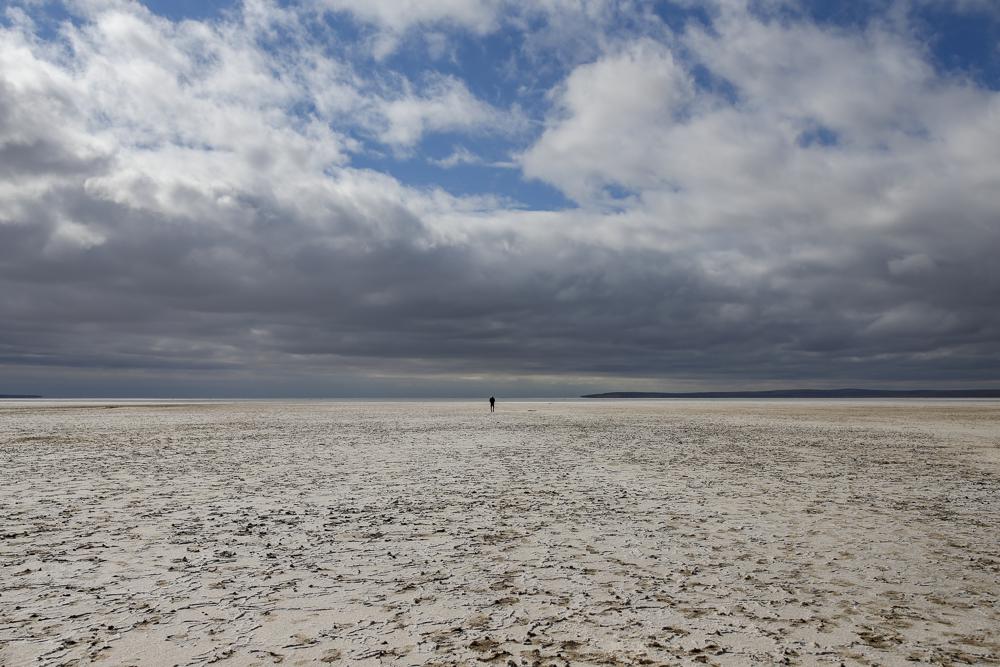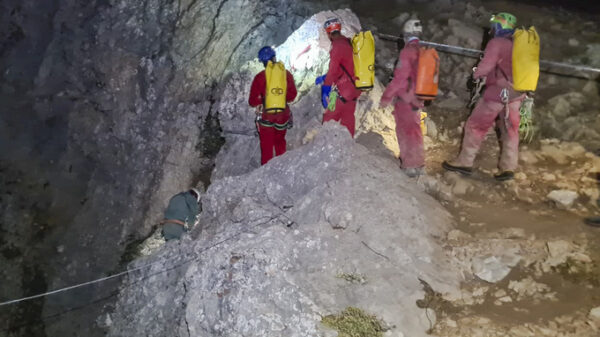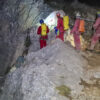A man walks along Lake Tuz in Aksaray province, Turkey, Monday, Oct. 25, 2021. Lake Tuz, Turkey’s second largest lake, and home to several bird species has seen its waters entirely recede this year, a victim of climate change-induced drought that has hit the region as well as decades-long wrongful agricultural policies that have exhausted the lake’s underground waters. (AP Photo/Emrah Gurel)
KONYA, Turkey (AP) — For centuries, Lake Tuz in central Turkey has hosted huge colonies of flamingos that migrate and breed there when the weather is warm, feeding on algae in the lake’s shallow waters.
This summer, however, a heart-wrenching scene replaced the usual splendid sunset images of the birds captured by wildlife photographer Fahri Tunc. Carcasses of flamingo hatchlings and adults scattered across the cracked, dried-up lake bed.
The 1,665 square kilometer (643 square mile) lake — Turkey’s second-largest lake and home to several bird species — has entirely receded this year. Experts say Lake Tuz (Salt Lake in Turkish) is a victim of climate change-induced drought, which has hit the region hard, and decades of harmful agricultural policies that exhausted the underground water supply.
“There were about 5,0000 young flamingos. They all perished because there was no water,” said Tunc, who also heads the regional branch of the Turkish environmental group Doga Dernegi. “It was an incredibly bad scene. It’s not something I can erase from my life. I hope I do not come across such a scene again.”
Several other lakes across Turkey have similarly dried up or have receded to alarming levels, affected by low precipitation and unsustainable irrigation practices. Climate experts warn that the entire Mediterranean basin, which includes Turkey, is particularly at risk of severe drought and desertification.
In Lake Van, Turkey’s largest lake, located in the country’s east, fishing boats no longer could approach a dock last week after the water fell to unusual levels, HaberTurk television reported.
”(We have) rising temperatures and decreasing rain, and on the other side, the water needs for irrigation in agriculture,” said Levent Kurnaz, a scientist at Bogazici University’s Center for Climate Change and Policy Studies. “It’s a bad situation all over Turkey at the moment.”
A study based on satellite imagery conducted by Turkey’s Ege University shows that water levels at Lake Tuz started to drop beginning in 2000, according to Turkey’s state-run Anadolu Agency. The lake completely receded this year due to rising temperatures, intensified evaporation and insufficient rain, according to the study.
The study also noted a sharp decline in underground water levels around Lake Tuz, a hypersaline lake that straddles the Turkish provinces of Ankara, Konya and Aksaray.
The Konya basin in central Anatolia, which includes Lake Tuz, was once known as Turkey’s breadbasket. Farms in the region have turned to growing profitable but water-intensive crops such as corn, sugar-beet and alfalfa, which have drained groundwater supplies, photographer Tunc said. Farmers have dug thousands of unlicensed wells while streams feeding the lake have dried up or been diverted, he said.
Environmental groups say poor government agricultural policies play a significant role in the deterioration of Turkey’s lakes.
“If you don’t pay them enough money, the farmers, they will plant whatever is water intensive and will make money for them. And if you just tell them it’s not allowed, then they won’t vote for you in the next election,” Kurnaz said.
The overuse of groundwater is also making the region more susceptible to the formation of sinkholes. Dozens of such depressions have been discovered around Konya’s Karapinar district, including one that Associated Press journalists saw next to a newly harvested alfalfa field.
Tunc, 46, a native of Aksaray, is saddened by the thought that he won’t be able to enjoy the flamingos with his 7-month-old son like he did with his 21-year-old son. He remains hopeful, however, that Lake Tuz may replenish itself, if the government stops the water-intensive agriculture.
Kurnaz, the climate scientist, is less optimistic.
“They keep telling people that they shouldn’t use groundwater for this agriculture and people are not listening. There are about 120,000 unlicensed wells in the region, and everybody is pumping out water as if that water will last forever,” Kurnaz said.
“But if you are on a flat place, it can rain as much as you want and it won’t replenish the groundwater in a short time. It takes maybe thousands of years in central Anatolia to replenish the underground water table,” he added.
The drought and flamingo deaths at Lake Tuz were just one of a series of ecological disasters to strike Turkey this summer, believed to be partly due to climate change.
In July, wildfires devastated swaths of forests along Turkey’s southern coast, killing eight people and forcing thousands to flee. Parts of the country’s northern Black Sea coast were struck by floods that killed 82 people. Earlier, a layer of sea mucilage, blamed on soaring temperatures and poor waste management, covered the Sea of Marmara, threatening marine life.
Although Turkey was among the first countries to sign the 2015 Paris climate agreement, the country held off ratifying it until this month as it sought to be reclassified as a developing country instead of a developed one to avoid harsher emission reduction targets. Turkish lawmakers issued a declaration rejecting the status of developed country at the same time they ratified the climate agreement.
In the town of Eskil, near the shores of Lake Tuz, farmer Cengiz Erkol, 54, checked the irrigation system on his field growing animal feed.
“The waters aren’t running as strong and abundant as they used to,” he said. “I have four children. The future doesn’t look good. Each year is worse than the previous year.”
Ayse Wieting and Robert Badendieck in Istanbul contributed.
Copyright 2021 Associated Press. All rights reserved.










































